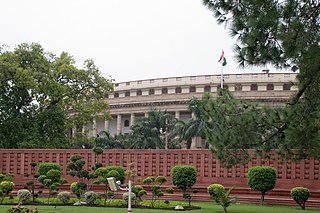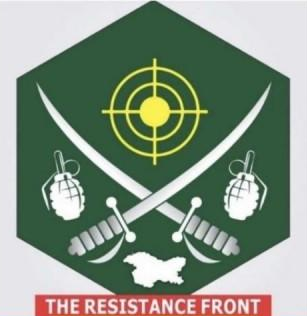
Jaish-e-Mohammed is a Pakistan-based Deobandi Islamist militant group active in Kashmir. The group's primary motive is to separate Kashmir from India and merge it into Pakistan.

The insurgency in Jammu and Kashmir, also known as the Kashmir insurgency, is an ongoing separatist militant insurgency against the Indian administration in Jammu and Kashmir, a territory constituting the southwestern portion of the larger geographical region of Kashmir, which has been the subject of a territorial dispute between India and Pakistan since 1947.

Uri is a town and a tehsil in the Baramulla district, in the Indian union territory of Jammu and Kashmir. Uri is located on the left bank of the Jhelum River, about 10 kilometres (6.2 mi) east of the Line of Control with Pakistan.

Mohammad Masood Azhar Alvi is a radical Islamist and terrorist, being the founder and leader of the Pakistan-based terrorist organisation Jaish-e-Mohammed, active mainly in the Pakistani-administered portion of the Kashmir region. His actions are not limited to the South Asian region; for instance, BBC News described him as "the man who brought jihad to Britain." On 1 May 2019, Masood Azhar was listed as an international terrorist by the United Nations Security Council.

The 2001 Indian Parliament attack was a terrorist attack on the Parliament of India in New Delhi, India on 13 December 2001. The attack was carried out by five armed assailants that resulted in the deaths of six Delhi Police personnel, two Parliament Security Service personnel, and a gardener. All five terrorists were killed by security forces.

The 2014–2015 India–Pakistan border skirmishes were a series of armed clashes and exchanges of gunfire between the Indian Border Security Force and the Pakistan Rangers: the paramilitary gendarmerie forces of both nations, responsible for patrolling the India-Pakistan border) along the Line of Control (LoC) in the disputed Kashmir region and the borders of the Punjab. Tensions began in mid-July 2014, with both countries' military officials and media reports giving different accounts of the incidents and accusing each other of initiating the hostilities. The incident sparked outrage in both countries and harsh reactions by the Indian and Pakistani militaries and the Indian and Pakistani governments.
At 7:30 am 5 August 2015, two members of the Lashkar-e-Tayyaba terrorist group attacked a Border Security Force (BSF) convoy in Udhampur, killing two BSF troops and wounding 10 civilians. One of the assailants, Mohammed Naved fled, while his accomplice, Mohammed Noman was killed in the attack. Noman is said to have tried boarding the bus, but was intercepted and killed by CRPF Jawan Suresh Kumar. Naved fled the scene to the Udhampur village, where he took three locals as hostages. He was later overpowered by the hostages and subsequently arrested.

The 2016 Uri attack was carried out on 18 September 2016 by four Jaish-e-Mohammed terrorists from Pakistan against an Indian Army brigade headquarters near the town of Uri in the Indian Jammu and Kashmir. 19 Indian soldiers were killed in the attack, and 19–30 others were injured. It was reported by the BBC as having been "the deadliest attack on security forces in Kashmir in two decades".

The 2016–2018 India–Pakistan border skirmishes were a series of armed clashes between India and Pakistan, mostly consisting of heavy exchanges of gunfire between Indian and Pakistani forces across the de facto border, known as the Line of Control (LoC), between the two states in the disputed region of Kashmir. The skirmishes began after India claimed to have conducted surgical strikes against militant launch pads within the Pakistani-administered territory of Azad Jammu and Kashmir on 29 September 2016.
There have been several attacks on Indian Armed Forces by militants in 2016.
The Indian Army base in Nagrota, in Jammu and Kashmir was attacked on 29 November 2016 by a group of militants.

Indian Army operations in Jammu and Kashmir include security operations such as Operation Rakshak, which began in 1990, Operation Sarp Vinash in 2003 and Operation Randori Behak in 2020. Other operations include humanitarian missions such as Operation Megh Rahat and operations with a social aim such as Operation Goodwill and Operation Calm Down. The Indian Army works in tandem with the other arms of the Indian Armed Forces and security forces in Jammu and Kashmir such as during Mission Sahayata or joint operations.

On 10 February 2018, at predawn, 3 Jaish-e-Mohammed terrorists attacked Sunjuwan Military Station, in the city of Jammu, in the Indian state of Jammu and Kashmir. Along with the attackers, 6 soldiers and 1 civilian were killed, while 20 were injured including 14 soldiers, and five women and children. Notably, this attack coincided with the death anniversary of Afzal Guru, convicted in the 2001 Indian parliament attack. The attack was described as one of the worst since the 2016 Uri attack.

On 29 September 2016, teams of Indian Army commandos crossed the Line of Control into Pakistani-administered Kashmir to attack targets up to a kilometer within territory held by Pakistan. The raid occurred ten days after four militants had attacked an Indian army outpost at Uri on 18 September 2016 in the Indian state of Jammu and Kashmir, and killed 19 soldiers. Estimates of casualties from India's cross-border attack varied widely, with figures of 12 to 70 being reported. The Pakistani government eventually acknowledged the deaths of two soldiers and injuries to nine, while one Indian soldier was captured.

Ansar Ghazwat-ul-Hind is an al-Qaeda-affiliated Islamist jihadist militant group active in Kashmir. The group's stated objective is to create Kashmir as an independent Islamic state under Sharia law and to fight jihad against Indian administration of Jammu and Kashmir.
The 2019 Pulwama attack occurred on 14 February 2019, when a convoy of vehicles carrying Indian security personnel on the Jammu–Srinagar National Highway was attacked by a vehicle-borne suicide bomber at Lethapora in the Pulwama district of the erstwhile state of Jammu and Kashmir. The attack killed 40 Indian Central Reserve Police Force (CRPF) personnel as well as the perpetrator—Adil Ahmad Dar—who was a local Kashmiri youth from the Pulwama district. The responsibility for the attack was claimed by the Pakistan-based Islamist terrorist group, Jaish-e-Mohammed. India blamed neighbouring Pakistan for the attack, while the latter condemned the attack and denied having any connections to it. The attack dealt a severe blow to India–Pakistan relations, consequently resulting in the 2019 India–Pakistan military standoff. Subsequently, Indian investigations identified 19 accused. By August 2021, the main accused along with six others had been killed, and seven had been arrested.
Ghazi Baba was a top ranking commander of Jaish-e-Mohammed and deputy commander of the militant group Harkat-ul-Ansar. He is known to have masterminded the 2001 Indian Parliament attack on 13 December 2001. He was also involved in two car blasts at the Army headquarters in Srinagar on 19 April 2000 and 25 December 2000, and in the Jammu and Kashmir legislative assembly car bombing of 1 October 2001. He was also known by several aliases, including Abu Jihadi, Sajid Jihadi, Shahbaz Khan, Mudasir Shahbaz, Saqlain, and Abu Hijrat. Ghazi was also reportedly involved in the kidnapping of 6 foreigners in Pahalgam, Jammu and Kashmir in 1995. In August 2003, Ghazi Baba was killed in an operation conducted by Border Security Force (BSF) in Srinagar.
The People's Anti-Fascist Front (PAFF) is a militant terrorist organization actively engaged in insurgency in Jammu and Kashmir, an ongoing armed conflict between Kashmiri separatist militants and Indian forces in Jammu and Kashmir. PAFF was established in 2020 by Jaish-e-Mohammad or Lashkar-e-Taiba, two Pakistan-based Jihadist militant groups.

The Resistance Front (TRF) is a militant organisation actively engaged in Insurgency in Jammu and Kashmir, and designated as a terrorist organisation in India. Indian government and other experts believe that the organisation was founded by and is an offshoot of Lashkar-e-Taiba, a Pakistan-based Jihadist terrorist group. The group is responsible for attacks on and killings of civilians, including those belonging to religious minority communities such as Kashmiri Hindus government employees, labourers and business owners, local politicians, and tourists, as well as for several attacks on Indian security forces including local policemen.












